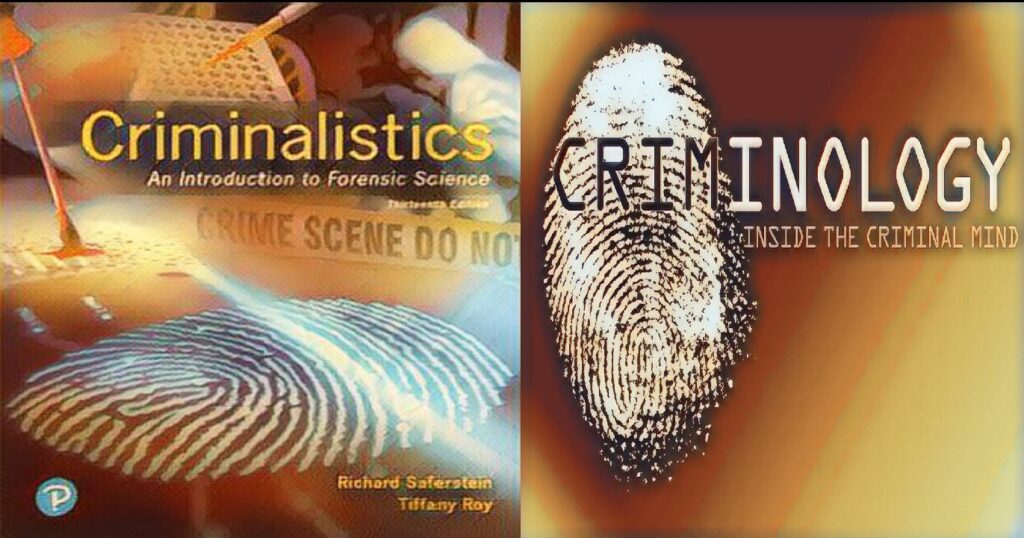Hello friends, I am Uzaif Kevin the author of your own website uzfkvn.com I hope you all are absolutely fine. I’m fine too. So without wasting time, in this Article I will tell you “What is Criminalistics? Let us know in detail about criminal science”
Soo Lets Begin,
Table of Contents
What is Criminal Justice and Criminalistics?
Criminal Justice: Criminal justice refers to the system of laws and institutions that are designed to uphold social order and deter criminal behavior. This system includes the police, courts, and correctional institutions that work together to investigate, prosecute, and punish individuals who have been accused or convicted of committing crimes.
The criminal justice system is responsible for enforcing laws and protecting the rights of citizens, as well as maintaining public safety. It is built on the principles of fairness, impartiality, and due process, which aim to ensure that every individual is treated fairly and justly regardless of their social status, race, or other factors.
The criminal justice process typically involves a series of stages, including investigation, arrest, arraignment, trial, and sentencing. Each of these stages is designed to ensure that the accused receives a fair trial and that justice is served for both the accused and the victims of the crime.
criminal justice is a vital component of any civilized society, as it helps to maintain order and promote safety while upholding the rights and freedoms of individuals.
Criminalistics: Criminalistics is the scientific study and application of physical evidence in the investigation of crimes. It is a subfield of forensic science that focuses on analyzing evidence found at crime scenes to determine what happened, who was involved, and how the crime was committed.
Criminalists use a wide range of scientific techniques and tools to analyze evidence such as DNA, fingerprints, blood spatter patterns, gunshot residue, and more. They work closely with law enforcement and other forensic experts to reconstruct the events of a crime and provide evidence that can be used in court.
The goal of criminalistics is to provide objective, scientific evidence that can help investigators solve crimes and ensure that the guilty are held accountable for their actions. It is an important field that plays a critical role in the criminal justice system and helps to ensure that justice is served.
Criminal justice and criminalistics are two related fields that are often used together in the investigation and prosecution of crimes.

Criminal justice is the system of laws and institutions that are designed to maintain social order and deter criminal behavior. This includes the police, courts, and correctional institutions that work together to investigate, prosecute, and punish individuals who have been accused or convicted of committing crimes.
Criminalistics, on the other hand, is the scientific study and application of physical evidence in the investigation of crimes. It involves the analysis of evidence found at crime scenes to determine what happened, who was involved, and how the crime was committed.
Criminal justice and criminalistics are complementary fields that work together to solve crimes and bring criminals to justice. Police and other law enforcement officials use criminalistics to gather evidence that
can be used to build a case against suspects, while prosecutors and defense attorneys rely on criminal justice principles to ensure that the accused are treated fairly and that justice is served.
criminal justice and criminalistics are both essential components of the legal system, and they play a critical role in maintaining social order, upholding the law, and protecting the rights and freedoms of citizens.

What is criminalistics forensic science?
Criminalistics is a subfield of forensic science that focuses on the scientific analysis and interpretation of physical evidence found at crime scenes. It involves the application of scientific principles and techniques to investigate and solve crimes.
Forensic science, in general, is the application of scientific methods and principles to the investigation of criminal and civil cases. This can include analyzing physical evidence, conducting forensic examinations, and providing expert testimony in court.
Criminalistics forensic science involves the examination of physical evidence such as blood, DNA, fingerprints, fibers, and other trace materials. Criminalists use a variety of scientific techniques and tools, such as microscopy, spectroscopy, chromatography, and serology, to identify and analyze evidence.
The goal of criminalistics forensic science is to provide objective, scientific evidence that can be used to help investigators solve crimes and support prosecutions in court. It plays a crucial role in the criminal justice system by helping to ensure that justice is served and the guilty are held accountable for their actions.
Criminalistics forensic science is a highly specialized field that requires extensive training and expertise in both scientific methodology and criminal justice principles. Criminalists must have a strong understanding of the scientific methods used to analyze physical evidence and the legal requirements for collecting, preserving, and presenting evidence in court.
Criminalistics forensic science is an interdisciplinary field that draws on a wide range of scientific disciplines, including biology, chemistry, physics, and mathematics. It is constantly evolving as new technologies and scientific techniques are developed, and it plays an increasingly important role in criminal investigations and prosecutions.
The work of criminalists in forensic science is critical to the criminal justice system, as it can help to establish the guilt or innocence of a suspect, exonerate the wrongly accused, and provide closure for victims and their families. The evidence collected and analyzed by criminalists is often the key to solving a crime and bringing a perpetrator to justice.

Difference between Criminalistics and Criminology?
Criminalistics and criminology are two related fields that are often confused, but they are actually quite different.
Criminalistics is a subfield of forensic science that focuses on the scientific analysis and interpretation of physical evidence found at crime scenes. Criminalists use a variety of scientific techniques and tools to examine evidence such as DNA, fingerprints, and fibers, and to determine what happened, who was involved, and how the crime was committed. Criminalistics is focused on the technical aspects of analyzing physical evidence and does not usually address the social or psychological factors that contribute to criminal behavior.
Criminology, on the other hand, is the scientific study of the nature, causes, and control of criminal behavior. Criminologists study a wide range of social, economic, and psychological factors that contribute to criminal behavior, and they use this knowledge to develop strategies for preventing and reducing crime. Criminology includes the study of criminal law, the criminal justice system, and the broader social and cultural context in which crime occurs.
In summary, criminalistics is focused on the scientific analysis of physical evidence, while criminology is focused on the broader social and psychological factors that contribute to criminal behavior. Both fields play important roles in the criminal justice system and work together to help prevent and solve crimes.

How to learn about criminalistics and criminal science?
Criminalistics and criminal science are vast fields that involve the application of scientific methods and techniques to criminal investigations. If you want to learn about criminalistics and criminal science, here are some steps you can follow:
- Research and read books: Start by reading books on criminalistics and criminal science. Look for books that cover a broad range of topics, from crime scene investigation to forensic science techniques. Some recommended books include “Criminalistics: An Introduction to Forensic Science” by Richard Saferstein and “Forensic Science: An Introduction to Scientific and Investigative Techniques” by Stuart H. James.
- Take courses: Many universities and colleges offer courses in criminalistics and criminal science. You can look for online courses or local courses that cover the basics of forensic science, criminal investigations, and criminal justice.
- Attend workshops and conferences: Attend workshops and conferences related to criminalistics and criminal science to learn about the latest developments and techniques in the field. These events also provide opportunities to network with experts in the field.
- Volunteer or intern: Volunteering or interning with local law enforcement agencies or forensic labs can provide hands-on experience in criminalistics and criminal science. This can help you gain practical knowledge and skills that cannot be learned through books or courses.
- Keep up with current events: Stay up-to-date with current events related to criminalistics and criminal science. Read news articles and watch documentaries to understand how forensic science is used to solve real-world crimes.
By following these steps, you can gain a solid understanding of criminalistics and criminal science and develop the skills needed for a career in these fields.

What is done with criminalist degrees?
A degree in criminalistics, also known as forensic science, can open up a wide range of career opportunities. Some of the career paths that individuals with a criminalist degree can pursue include:
- Crime scene investigator: Crime scene investigators collect and analyze physical evidence at crime scenes to help solve crimes.
- Forensic science technician: Forensic science technicians work in laboratories and analyze evidence collected at crime scenes. They use scientific techniques to identify and analyze evidence, such as DNA, fingerprints, and ballistics.
- Forensic pathologist: Forensic pathologists are medical doctors who perform autopsies to determine the cause of death in cases of suspicious or violent deaths.
- Forensic psychologist: Forensic psychologists work with the legal system to evaluate defendants and witnesses to determine their mental state and the impact it may have had on their actions.
- Digital forensics analyst: Digital forensics analysts analyze digital evidence, such as computer files and network logs, to help solve cybercrimes.
- Forensic accountant: Forensic accountants investigate financial crimes, such as embezzlement and fraud, by analyzing financial records and transactions.
Overall, a degree in criminalistics can lead to a variety of exciting and challenging careers in the criminal justice system, law enforcement, and private sector.
More Read:






